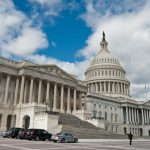 On December 14th, a group of librarians sent a letter to Congress explaining why they believe the Copyright Office should remain under the control of the Library of Congress. Written by University of Virginia Library’s Brandon Butler, the letter is a self-contradicting and uninformed response to recent recommendations on reform of the Copyright Office offered by leading members of the House Judiciary Committee. Read more
On December 14th, a group of librarians sent a letter to Congress explaining why they believe the Copyright Office should remain under the control of the Library of Congress. Written by University of Virginia Library’s Brandon Butler, the letter is a self-contradicting and uninformed response to recent recommendations on reform of the Copyright Office offered by leading members of the House Judiciary Committee. Read more
Category: Uncategorized
Members of Congress Express Concerns About Abuses of PTO’s Inter Partes Review System
 Two years ago, CPIP published an issue paper warning about the tremendous potential for abuse inherent in the America Invents Act’s newly-created administrative review programs. It now appears that several members of Congress are concerned as well. On December 5, 2016, a bipartisan group of New York representatives sent a letter to Michelle Lee, Director of the United States Patent and Trademark Office (USPTO), raising their concerns about abuse of the inter partes review (IPR) system by financial speculators. Read more
Two years ago, CPIP published an issue paper warning about the tremendous potential for abuse inherent in the America Invents Act’s newly-created administrative review programs. It now appears that several members of Congress are concerned as well. On December 5, 2016, a bipartisan group of New York representatives sent a letter to Michelle Lee, Director of the United States Patent and Trademark Office (USPTO), raising their concerns about abuse of the inter partes review (IPR) system by financial speculators. Read more
New Paper Exposes Flaws in Smallest Salable Patent-Practicing Unit Rule
 CPIP Research Scholar Jonathan Putnam and co-author Tim Williams’ paper “The Smallest Salable Patent-Practicing Unit (SSPPU): Theory and Evidence,” shows how poorly patent law measures the value of litigated patents. Using theory and empirical evidence, they show that the economic contribution of patented technology is better measured by the output, such as the commercial product, rather than the smallest input, or component, that embodies the invention. Read more
CPIP Research Scholar Jonathan Putnam and co-author Tim Williams’ paper “The Smallest Salable Patent-Practicing Unit (SSPPU): Theory and Evidence,” shows how poorly patent law measures the value of litigated patents. Using theory and empirical evidence, they show that the economic contribution of patented technology is better measured by the output, such as the commercial product, rather than the smallest input, or component, that embodies the invention. Read more
Digital Single Market Must Protect the Rights of All Authors and Publishers
Cross-posted from the Mister Copyright blog.
 In 2015, the European Commission unveiled a plan to “create a free and secure digital single market” that would expand and standardize the EU’s digital economy for the benefit of consumers. The strategy was named the Digital Single Market and one of its objectives is to modernize the EU copyright framework to fit the digital age. Read more
In 2015, the European Commission unveiled a plan to “create a free and secure digital single market” that would expand and standardize the EU’s digital economy for the benefit of consumers. The strategy was named the Digital Single Market and one of its objectives is to modernize the EU copyright framework to fit the digital age. Read more
New Paper Addresses Flaws in Patent Holdup Theory
 Stephen Haber and Alexander Galetovic of the Hoover Institution’s Working Group on Intellectual Property, Innovation and Prosperity (IP2) published a new working paper on the problems with Patent Holdup Theory. In “The Fallacies of Patent Holdup Theory,” Professors Haber and Galetovic show that Patent Holdup Theory is based on three fundamental errors. Read more
Stephen Haber and Alexander Galetovic of the Hoover Institution’s Working Group on Intellectual Property, Innovation and Prosperity (IP2) published a new working paper on the problems with Patent Holdup Theory. In “The Fallacies of Patent Holdup Theory,” Professors Haber and Galetovic show that Patent Holdup Theory is based on three fundamental errors. Read more
Federal Circuit Improperly Extends Abstract Idea Exception to Industrial Machines
 An oil well drilling rig is not an abstract idea. A method of operating an oil well drilling rig is also not an abstract idea. This proposition should be clear to all, but in TDE Petroleum Data Solutions v AKM Enterprise, the Federal Circuit held that a method of operating an oil well drilling rig is directed to the abstract idea of “storing data, receiving data, and using mathematics or a computer to organize that data and generate additional information.” Read more
An oil well drilling rig is not an abstract idea. A method of operating an oil well drilling rig is also not an abstract idea. This proposition should be clear to all, but in TDE Petroleum Data Solutions v AKM Enterprise, the Federal Circuit held that a method of operating an oil well drilling rig is directed to the abstract idea of “storing data, receiving data, and using mathematics or a computer to organize that data and generate additional information.” Read more
New CPIP Report: The Global Patent Pendency Problem
 Why are some of the biggest fights about patent policy almost pointless in some places? Because in many countries, including some of the world’s most important emerging economies, it takes so long to get patents that the rights have little meaning. Read more
Why are some of the biggest fights about patent policy almost pointless in some places? Because in many countries, including some of the world’s most important emerging economies, it takes so long to get patents that the rights have little meaning. Read more
Content Thief Turned Content Creator Rails Against Piracy
Cross-posted from the Mister Copyright blog.
 Last week, YouTube celebrity (yes, that’s a thing now) Olajide “JJ” Olatunji posted an expletive-filled tirade aimed at those illegally downloading his new movie “Laid in America.” After fans of Olatunji (aka KSI), whose YouTube page has over 14 million subscribers, began notifying him of the film’s availability on a number of illicit torrent sites, he lashed out at the people pirating the film, listing the many legal services offering his work, and explaining – in not so subtle terms – how illegally downloading the film hurts all who contributed to its creation. Read more
Last week, YouTube celebrity (yes, that’s a thing now) Olajide “JJ” Olatunji posted an expletive-filled tirade aimed at those illegally downloading his new movie “Laid in America.” After fans of Olatunji (aka KSI), whose YouTube page has over 14 million subscribers, began notifying him of the film’s availability on a number of illicit torrent sites, he lashed out at the people pirating the film, listing the many legal services offering his work, and explaining – in not so subtle terms – how illegally downloading the film hurts all who contributed to its creation. Read more
Second Circuit Brings Some Sanity Back to Transformative Fair Use
 The Second Circuit handed down an opinion in TCA Television v. McCollum earlier this week holding that a play’s inclusion of Abbott and Costello’s famous “Who’s on First?” routine was not transformative fair use. Given how expansive transformativeness has become lately, especially in the Second Circuit, the opinion is somewhat surprising. Read more
The Second Circuit handed down an opinion in TCA Television v. McCollum earlier this week holding that a play’s inclusion of Abbott and Costello’s famous “Who’s on First?” routine was not transformative fair use. Given how expansive transformativeness has become lately, especially in the Second Circuit, the opinion is somewhat surprising. Read more
Supreme Court Should Not Reward Efficient Infringement in Apple v. Samsung
 In Apple v. Samsung, the Supreme Court is presented with a classic issue of statutory interpretation in the case that has come to exemplify the Smart Phone Wars. In one of the many lawsuits brought by Apple against Samsung after Samsung rejected Apple’s offer to license its patents, a jury found Samsung liable for infringing Apple’s design patents on the iPhone. Read more
In Apple v. Samsung, the Supreme Court is presented with a classic issue of statutory interpretation in the case that has come to exemplify the Smart Phone Wars. In one of the many lawsuits brought by Apple against Samsung after Samsung rejected Apple’s offer to license its patents, a jury found Samsung liable for infringing Apple’s design patents on the iPhone. Read more